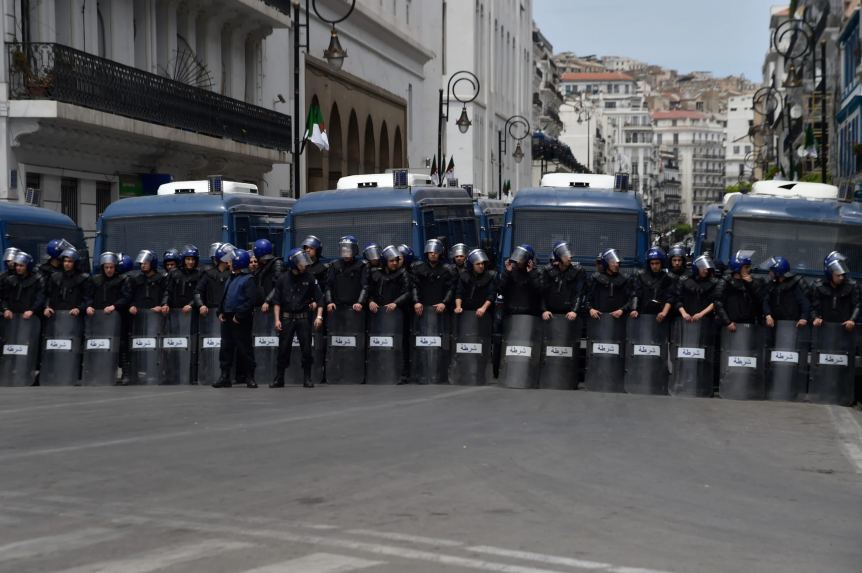The Cairo Institute for Human Rights Studies (CIHRS) held a webinar titled, “Algeria: An Alarming Regression for Human Rights – Assessment and Recommendations ahead of Algeria’s UPR,” on 5 July 2022, on the sidelines of the 50th session of the United Nations Human Rights Council. cihrs.netanized the webinar in cooperation with the International Federation for Human Rights, CIVICUS: World Alliance for Citizen Participation, ARTICLE 19, DIGNITY the Danish Institute Against Torture, MENA Rights Group, and Jubilee Campaign.
The webinar included Farida Bouattoura, member of Shoaa for Human Rights; Ismahan Ait-Messaoud, member of Association Tharwa N’Fadhma N’Soumeur; Boukhalfa Ben Mamar, member of Riposte Internationale; Sofiane Chouiter, founder of Justitia Center for the Legal Protection of Human Rights; Youssef Ourahmane of the Algerian Protestant Church. Nadège Lahmar, Maghrab Researcher at CIHRS, moderated the webinar session.
The webinar commenced with Farida Bouattoura saying that Algeria has witnessed massive human rights violations since the last Universal Periodic Review (UPR) of Algeria’s human rights file before the United Nations , especially in light of the Algerian government’s violent suppression of the pro-democracy Hirak movement demonstrations. The demonstrations erupted across Algeria since February 2019, while the authorities have arrested dozens of activists, journalists and protesters. Bouattoura added that the Algerian government, to this day, deliberately employs national legislation and the penal code to restrict and limit freedom of peaceful assembly and freedom of association, despite Algeria’s pledge before the United Nations to amend national laws to guarantee these freedoms.
Boukhalfa Ben Mamar pointed out that the 2020 amendments to Laws no. 20-06 and no. 20-05 allowed the criminalization of journalism work, and imposed additional restrictions on freedom of expression. Boukhalfa Ben Mamar added that it is necessary to amend Articles 54 and 55 of the constitution, to ensure the lifting of all restrictions imposed on freedom of expression, and the cessation of all practices limiting the freedom of journalistic work.
Ismahan Ait-Messaoud focused on the situation of women in Algeria in recent years, who are subjected to multiple violations. Messaoud stated, “The Algerian penal code doesn’t grant women any access to justice, recognition, or support. The Algerian penal code still allows for a rapist to be acquitted if their victim withdraws their complaint. This leads to rape victims facing threats and pressure if they go to authorities.” Ismahan Ait-Messaoud continued by explaining that the Algerian labour law does not guarantee equality between men and women in the workplace.
Meanwhile, Youssef Ourahmane focused on government practices restricting the right to freedom of worship and freedom of belief, describing the government’s policies as “The Algerian government wants to keep the church very weak and ultimately see it disappear.”
Ourahmane stated that the license of the Algerian Protestant Church Association has not been renewed by the Algerian government since 2014. This prompted them to transform their houses into churches because the Algerian government does not allow the construction of any churches. The Algerian government issued the ordinance of 2006, which led to a crackdown on the Algerian Protestant Church. The ordinance criminalizes, in its vague articles 8, 9 and 10, any practice aimed at “undermining the faith of a Muslim” – punishable by imprisonment of up to three years.
According to Sofiane Chouiter, “In theory; the constitution guarantees freedoms and liberties, but in practice, all of these freedoms are limited and conditioned by national laws that, in fact, limit those freedoms. In addition, Article 34 of the 2020 Algerianconstitution is vague and allows for the limitation of rights.”
Chouiter added that the constitution allows for excessive power and direct interventions by the executive authority and the president of the country in the Algerian Judicial Council, which limits judicial independence and negatively affects the right to access justice. Finally, Chouiter called on the Algerian authorities to amend the constitution to achieve a clear separation of powers between the executive and the judiciary.
Share this Post

